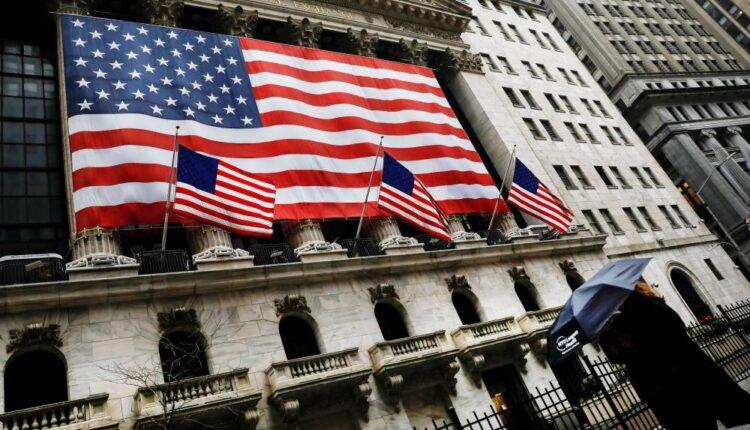
- "At the end of the day, the stock market's made up of big, huge companies, not the small- to medium-sized businesses that are the backbone of our economy," CNBC's Jim Cramer said Tuesday.
- "I agree it's messed up, but the contrast between a roaring stock market and an obliterated job market does tell you a lot about what's happening at this moment," he said.
- "You don't have to like it — I know I don't — but it's the big dogs with pristine balance sheets and gigantic scale that can survive this lockdown," the "Mad Money" host said as the Dow rallies against the backdrop of record layoffs.
VIDEO3:2103:21Jim Cramer: 'The Dow is not supposed to be representative of the broader economy'Mad Money with Jim Cramer
CNBC's Jim Cramer on Tuesday explained the paradox of a stock market that is heating up while the state of the economy appears to be crumbling amid a health crisis and economic shutdown in the United States.
"At the end of the day, the stock market's made up of big, huge companies, not the small- to medium-sized businesses that are the backbone of our economy," the "Mad Money" host said. "You don't have to like it — I know I don't — but it's the big dogs with pristine balance sheets and gigantic scale that can survive this lockdown."
Cramer made the comments in response to a viral screenshot of a scene from his Thursday show that circulated online.
"There's a seething anger sweeping this country and it's directed point-blank at Wall Street," Cramer said after the market staged another rally in Tuesday's session. "This relentless rally seems unfair, it seems senseless and it seems heartless" amid a deadly coronavirus emergency.
The image, which juxtaposed a strong weekly gain for the Dow Jones index against multiple weeks of record job losses, was shared widely on social media platforms, including in a tweet by Rep. Alexandria Ocasio Cortez, D-New York, who sought to highlight a contradiction between Wall Street and Main Street.
"When late stage capitalism takes a selfie," the lawmaker from New York wrote in a tweet that was reshared more than 43,000 times on the platform.
The screenshot, according to Cramer, did little to explain why the blue-chip stock index managed to rise almost 13% last week in its biggest weekly advance since the middle of the Great Depression.
The host explained on Thursday that a combination of economic response measures taken by the central bank and federal government helped boost market confidence about the country's odds to soften the economic blow from the global pandemic.
"While I'd rather have stocks go up than go down … believe me, there's no joy in stockville right now," Cramer said Tuesday. "And I agree it's messed up, but the contrast between a roaring stock market and an obliterated job market does tell you a lot about what's happening at this moment."
Cramer has spent months sounding the alarm about how the coronavirus outbreak could severely impact the U.S. economy.
As the virus spread quickly across the world from Wuhan, China, global supply chains were thrown off balance. The longest bull run in U.S. history broke in February as financial markets dove into bear market territory, or 20% below a recent peak, in record time.
Coronavirus fears later pushed state and local governments in the U.S. to force citizens into quarantine and nonessential businesses to close as health officials sought to get a handle on the health crisis.
Lawmakers then moved quickly to pass three pieces of legislation in March, including the historic $2.2 trillion stimulus bill, to distribute rescue money for small and large businesses on top of direct payments to Americans.
Additionally, the Federal Reserve has committed to pumping $2.3 trillion into the economy to provide liquidity that can help businesses stay above water and help local governments prevent budget cuts during the downturn. More government action could come in the near future, should the crisis continue to drag on.
"[Officials] know 16 million jobs lost is unconscionable," Cramer said. "So the Fed, Treasury, White House, Congress: they're pulling out all the stops" to "boost the economy."
The Dow managed to have its best week since 1938 because the stock average is not representative of the broader economy, Cramer said. In addition to government action, stocks have been able to rise because the market is recovering from deep declines after investors "got too negative." Big corporations are growing even bigger as small businesses face mounting challenges and there is hope that a vaccine will ready for public use by 2021, Cramer said.
Additionally, the stock market is not always in tune with the economy. A disconnect can exist between the two because stock prices tend to reflect investor sentiment about future corporate earnings.
"Maybe it would feel more just if big business was getting crushed along with everyone else — like we saw during the Great Recession," Cramer said. "But when big business gets crushed, you get a lot more layoffs. You don't want to cut off your nose to spite your face."
VIDEO11:5011:50Jim Cramer: Large companies control the market, despite record layoffsMad Money with Jim Cramer
Questions for Cramer?
Call Cramer: 1-800-743-CNBC
Want to take a deep dive into Cramer's world? Hit him up!
Mad Money Twitter – Jim Cramer Twitter – Facebook – Instagram
Questions, comments, suggestions for the "Mad Money" website? madcap@cnbc.com
Source: cnbc.com

